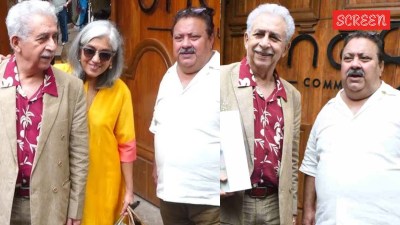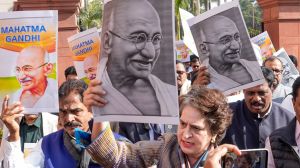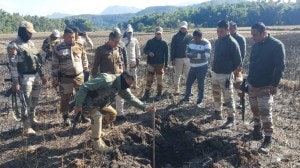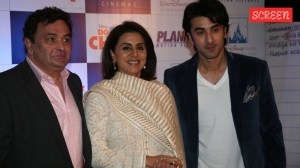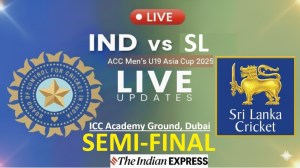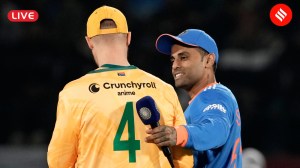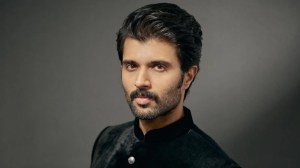Click here to follow Screen Digital on YouTube and stay updated with the latest from the world of cinema.
I didn’t even hear the script of Zanjeer,thought it would be too much of pressure: Ram Charan Teja
In an exclusive conversation with Screen's Priyanka Sinha Jha,Ram Charan Teja talks about stepping into Big B's shoes and the changing face of Telugu cinema.
Apoorva came and told me that they were planning to make Zanjeer; I didnt even hear the script at our first meeting. The first thing that came to my mind was that I didnt want to do the film as it would be too much of a pressure. As it is I am trying to handle the pressure of being Chiranjeevis son,coming out of it was a huge task by itself
I am not a very careful actor. I am spontaneous. I like leaving a bit of loose ends. I think that will help me grow. I dont like to close all my options while working
What is it like to be a part of Zanjeer, one of the finest Hindi films?
Its a great opportunity for me. My father (South superstar Chiranjeevi) had this movie in his library for the longest time. It was the epitome of the perfect commercial movie and I am very lucky and fortunate to have a script like this for my launch in Hindi films. Beyond this,the whole (Amitabh) Bachchan aura around this movie is a huge pressure on all of us,including the director and entire team. But I guess that aura was also a challenge. Its worked to our advantage as the whole team worked amazingly well under the pressure.
How did the project come to you?
About a year and half back,somebody from Apus (Apoorva) team had contacted us when I was not even looking at coming here. They had seen my movie Magadheera,and so when this project came to Apoorva,he came and told me that they were planning to make a film on it. I didnt even hear the script at our first meeting. The first thing that came to my mind was that I didnt want to do the film as it would be too much of a pressure. As it is I am trying to handle the pressure of being Chiranjeevis son,coming out of it was a huge task by itself. I think I have been successful in handling it. So why would I want to take on another headache? I told Apu to leave me out of it,which he respected and went back. But for some reason he couldnt visualise anybody else in the script. He called me again and said,Forget Zanjeer, let me narrate you a script. I agreed. He came back and narrated the script to me. I barely remembered Zanjeer,some bits of it,but not from scene-to-scene.
When I heard the script,it was the perfect script. He said,Remove the tag Zanjeer from it and its a good script,completely modernised and apt for this generation. Why cant you just view it as a good script? I said,Fair enough,give me couple of days to read the script. When I sat with my dad (he is the only man with whom I discuss everything),he asked me on what basis I was saying no to this script. I said,Dad I am scared! He said,Never reject a movie because you are scared,reject a movie if you dont like the script. Its like a coward taking a backstep. I dwelt on the script for eight months before saying yes,and the rest is history.
Did you revisit the original after you were offered to work on it?
Oh yes,I have seen it a couple of times,hoping to lend my own flavour to it. But its a huge responsibility because its not just the character,but the entire story,the nuances of a classic… Though the characters have changed in our version,the essence of the movie is still there.
How was it working in your first ever Hindi film?
If you watch Hindi films,you always have the Hindi flavour within you. More than the language,it was the script. I didnt have to learn the language perfectly,so it was fine. I liked the working culture here. Its more productive and quick. Apoorva has a great team and I am going to miss working with him.
Which is your favorite scene?
I think scenes with Priyanka (Chopra) were very new to me as I have not done a full-on romance on screen,ever. I was always into action and more action,so those scenes were quite a task for me to pull off. But PC helped a lot and it came out beautifully. I was pleasantly surprised to see myself in these delicate scenes.
What would you say about the controversy (Salim-Javed,the writers of the film are taking the producers to court over copyright) surrounding the film?
Well,its between two departments production and writing,and the court has to decide who is right.
How do you approach your scenes do you rehearse your lines or just get the essence of the situation?
You nailed it we just get the essence first. Its not the dialogue or the words,its about how you feel it. We then rehearse the scenes and work on the dialogues. Like PC had to work on her Telugu lines,I had to work on my Hindi lines. The feel was the same for both.
How would you describe yourself as an actor cautious or experimental? Spontaneous or studied?
No,I am not a very careful actor. I am spontaneous. I like leaving a bit of loose ends. I think that will help me grow. I dont like to close all options,while I work.
Anything that you have imbibed from your fathers style of acting?
I tried,but I end up losing myself while trying to fit into his pattern of acting. I would rather understand his technique and learn about doing ones homework from him. On screen,I have tried to get my own style,but I have learnt to be spontaneous from my dad. He was never a method actor and never the kind,who looks perfect on the screen.
Shabana Azmi in an interview had told me that the notion of spontaniety in acting is a contradiction,because if you have pre-meditated it,its not spontaneous. Whats your take on it?
We rehearse the scene 20 minutes before the shoot to understand the technical side. I need to get the technical department familiar with my movements,and also make sure I dont give away everything. When I give them my position,I give them 30 per cent of what Ill be doing. As for the rest,even I dont know what I am going to do. When they say roll or action,I might do something completely different,but I have to give the direction of the scene to the cinematographers where I am looking,how I turn,the basics of film shooting. Thank God,my technicians have given me the freedom to do whatever I want when the camera rolls.
How important is it for a male actor to be adept at dance?
I love dancing. I am known for my dancing in South and Apoorva tried inculcating that essence into this movie,though not too much. We have more dancing in Telugu films.
For an Indian actor,dance is essential. Our audience loves it. It is the trademark of Indian cinema,so why we lose it? Why ape the west and not have songs? They start looking at us because they are different from us. There is a whole new meaning to Bollywood cinema today.
What is the challenge for an actor when shooting in two different languages?
I thought it would be really taxing for an actor,but it turned out pretty good. Like for a Hindi film,it takes around 70-80 days and you would be surprised that we finished this movie in two languages within a span of just 75 days! The team is fast and superb. It is shocking how we achieved it in 75 days.
Are there any more Hindi films in the pipeline?
Frankly,nothing as of now. Chota-mota offers,but I will figure that once the film is released.
Do you have any friends in Hindi film industry?
I have known Salman (Khan) for a long time because my dad and he worked on Thumbs Up ad a while ago. My dad was the brand ambassador for the drink for South and Salman, for the North. They used to go for shoots together and have kept in touch since then. He has been like a big brother for me here. During the first schedule,he sent me lunch on the sets. He is really kind. I also made him hear the script,and he loved it. He got nostalgic about it since his father (Salim Khan) had originally written the script.
Your film Magadheera was also to be made in Hindi,are would you be part of it?
I dont think I could recreate what I did in the original. It was not just me,but the whole team that worked along with me. If I have the same team working with me again,I would think about doing the film again.
Do you also have pressure of 100 crore collection. In the Telugu film industry,UTV was saying that what Mahesh Babu films make is equivalent to Hindi films Rs.100 crore.
Today the highest grosser over there is still Magadheera,which is like Rs. 120 crore. That was about five years back. Now,I have to break my own record,but I dont know when that would be. We (Mahesh,Pawan Kalyan and I) are all trying to break that record. Somebody has to break it.
Telugu cinema is said to be very action driven and violent? Is that changing?
The films have been quite violent,but yes,it is changing. More universal family audience friendly scripts are coming up now. Films scripts are now becoming more character-driven and sensible. Its not necessary to have excess of violence in movies,unless it is a period drama or a slice of history.
Would it be correct to say that South films are also more personality driven than others?
Its more hero-driven. The good part about Bollywood is that we have both. We have hero-driven films and films like Kai Po Che doing well too. That is yet to happen in south. And I wish that it happens soon.
Multiplexes are suppose to be very few down South. Is that changing too?
I dont know why single theatres are still so prominent over there. The highest number of theatres per state is in Andhra Pradesh (they have around 2800 theatres). The highest viewing or footfalls in a theatre happens in Andhra. Multiplexes are catching up,and they are mostly in Hyderabad and a few other places in Andhra Pradesh. Having said that,I guess the cinema we make caters to the audience in single screens and the money is still big in these screens. For movies that are experimental,multiplexes are a better platform. But then again the multiplex audience is not very particular about actors. They dont have favourites. They change every Friday,but single screen viewers are very loyal to their stars.
How important are studios in the film industry down South?
Studios like Reliance and UTV are still trying to get a foothold in south. I think it has more to do with the fact that the single screen distributor network is very strong in the south. It would be as tough as dealing with some small-time mafia over there. To crack a film there,one needs to understand the distribution network to ensure a good release there. Someone from Mumbai or Delhi cannot understand their work pattern. They are relation-driven,but they are also very shrewd and so one needs to understand their method of doing business.
Which Telugu films are you currently working on?
This year I have three releases one happened in January,there is another release in June and one in July,though the dates have to be worked out.
- 01
- 02
- 03
- 04
- 05



